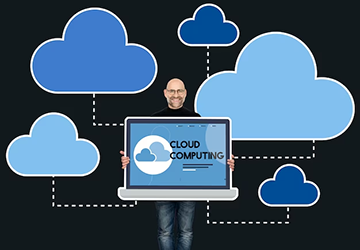Cloud computing has gone through an astonishing transformation since its inception. Once perceived merely as online storage, it has become a comprehensive suite of solutions that fundamentally change how businesses and individuals operate. Understanding Cloud Computing involves recognising its multi-faceted nature, from data analytics and machine learning services to application hosting. Its evolution reflects broader changes in the computing landscape, where flexibility, scalability, and cost-efficiency have become paramount.

For businesses, Cloud Computing Explained is best understood as a competitive advantage. Staying ahead in today's fast-paced digital environment means adopting agility and scalability technologies. Cloud computing platforms, like AWS, Azure, and Google Cloud, offer companies the ability to scale resources up or down as needed; this ensures businesses pay for only what they use, resulting in significant cost savings over traditional IT infrastructure. The cloud also brings robust security measures, helping companies protect sensitive data more effectively.
For the average individual, the Basics of Cloud Computing are surprisingly relevant. Whether saving photos on Google Drive or editing a document in real-time with a colleague via Microsoft 365, you're using cloud computing. These services enable more than just convenience; they facilitate collaboration and accessibility. With files stored in the cloud, you can access them from any device with an internet connection, breaking down the barriers that come with localised storage.
Of course, with technological advancements come potential drawbacks. Understanding Cloud Computing is only complete by acknowledging the risks involved. Data breaches, unauthorised access, and service downtime are some challenges you may encounter. Choosing providers that comply with regulatory standards and implement robust security measures is crucial. Two-factor authentication, data encryption, and regular backups are critical to minimise these risks.
Discussing advancements like IoT, Artificial Intelligence, and Big Data without mentioning cloud computing is impossible. These emerging technologies rely heavily on the processing power and data storage capabilities that the cloud provides. Therefore, Cloud Computing Explained also extends to how it serves as the backbone for technologies that are shaping the future.
Today, environmental sustainability is not just a buzzword; it's a global imperative. Interestingly, cloud computing is stepping up to become an integral part of the solution to this colossal challenge. Traditional data centres are notorious for being energy hogs, requiring vast amounts of electricity to keep servers cool and operational. However, industry giants like Amazon Web Services (AWS) and Google Cloud are revolutionising this space. When you dig deeper into Understanding Cloud Computing, it becomes evident that these companies are investing heavily in renewable energy sources, from wind to solar, to make their data centres as green as possible. By doing this, they offset their carbon emissions and pave the way for a more sustainable future in technology. Therefore, a comprehensive understanding of cloud computing must include its impact on environmental sustainability.
Cloud computing is proving transformative, especially in life-critical sectors like healthcare. At the foundational level, the Basics of Cloud Computing in healthcare include everything from streamlining administrative procedures to enabling telemedicine. With the advent of cloud technologies, healthcare providers can now efficiently manage electronic health records. But, the role of cloud computing continues beyond that. Real-time monitoring of patient vitals, predictive analytics for diseases, and even intricate processes like gene mapping and sequencing are increasingly becoming cloud-enabled. This holistic approach to patient care is possible because of the power and flexibility cloud computing offers, underscoring the Importance of Cloud Computing in modern healthcare systems around the globe.

Understanding the legal obligations associated with cloud computing can be daunting. The landscape is complex, dotted with regional and international laws like the General Data Protection Regulation (GDPR) in Europe and the California Consumer Privacy Act (CCPA) in the United States. A well-rounded Understanding of Cloud Computing necessitates that businesses be aware of how different cloud service providers are addressing these regulations. Compliance isn't just about avoiding fines but building customer trust. When companies can ensure they're meeting all regulatory standards by keeping up with the Basics of Cloud Computing, they also show that they value customer data and privacy. That's why regulatory compliance should be a significant factor when considering cloud service providers, whole to illustrating another facet of the Importance of Cloud Computing in today's interconnected world.
The cloud computing landscape offers a range of solutions, but the hybrid cloud stands out for its versatility. A Hybrid Cloud allows organisations to use private and public cloud services, offering the perfect balance between security and scalability. For instance, sensitive financial data can be stored on a private cloud, while a public cloud can handle less sensitive operational data. Understanding this flexibility is critical to Cloud Computing Explained in the modern era. The hybrid approach allows organisations to tailor their cloud computing strategies.
The world of cloud computing is ever-evolving, and its future looks bright with possibilities. As we look ahead, Understanding Cloud Computing will increasingly involve integrating it with other emerging technologies like artificial intelligence, blockchain, and even quantum computing. These technologies can potentially revolutionise various aspects of business and personal computing.
The rapid adoption of cloud services isn't just a trend; it's an indicator of where the future of computing lies. Understanding Cloud Computing is no longer optional; it's necessary for anyone looking to stay relevant in a digitised world. From individual users storing personal photos to corporations hosting vast databases, the cloud offers an efficient, scalable solution that can adapt to ever-changing needs.